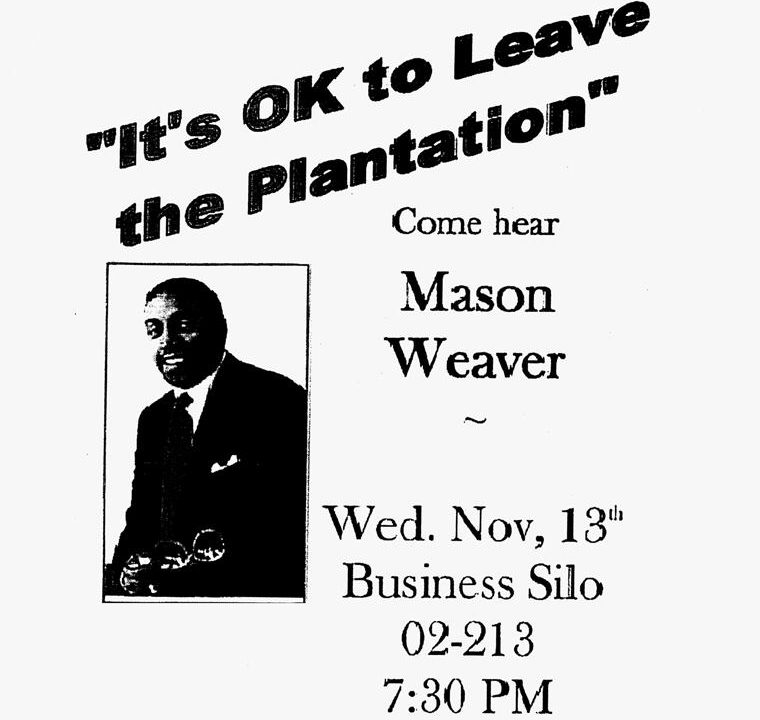
Case Update
Case Status: Victory. University settled on terms favorable to student.
Hinkle v. Baker
- Categories:
- Freedom of Speech
A win for free speech in suit against California school
Cal Poly admits 1st Amendment protects flier minorities found offensive
Washington, D.C. — In a win for the free speech rights of students, California Polytechnic State University has conceded to the demands of a First Amendment lawsuit by one of its students. The student, Steven Hinkle, was found guilty of “disruption” by the University last spring after minority students called campus police to complain that a flier promoting a black conservative speaker was “offensive.” The Center for Individual Rights (CIR) announced today that the University has backed down, agreeing to clear Hinkle’s record, protect his First Amendment rights in the future, and pay for the cost of his lawsuit.
The federal lawsuit, Hinkle v. Baker, arose from a November 2002 incident, in which Steven Hinkle, a white student, attempted to post a flier on a public bulletin board in the Multicultural Center at California Polytechnic State University in San Luis Obispo. The flier contained only the time and place of the lecture, a photo of the speaker — black conservative Mason Weaver — and the title of Weaver’s book. In his book, It’s OK to Leave the Plantation, Weaver argues that dependence on government puts many African Americans in a situation similar to slavery.
A group of African-American students in the Multicultural Center, who later claimed to be holding a bible study meeting, told Hinkle the flier was offensive and that he could not post it. Hinkle asked “Can’t we sit down and talk about it?” But, after one of the students threatened to call the campus police, Hinkle departed without posting the flier. The student, who claimed the flier was “hate speech against us,” called the police anyway.
In January 2003, Cal Poly charged Hinkle with “disruption” of a “campus event” — the bible study — under California Code of Regulations, Title 5, Section 41301(d). Neither the complaining students nor Cal Poly administrators claimed that Hinkle physically disrupted the purported bible study. Instead, they pointed to the allegedly offensive nature of the flier and the distraction caused by the students’ reaction to it. As a result, Hinkle was subjected to a seven-hour judicial hearing and found guilty. Hinkle was ordered to write letters of apology to the offended students and was told he risked stiffer penalties up to expulsion if he refused.
Steve Hinkle turned for assistance to the Foundation for Individual Rights in Education (FIRE) in Philadelphia, which began a campaign to publicly expose the violation of his First Amendment rights. When Cal Poly officials refused to back down, FIRE enlisted the help of attorneys at the Center for Individual Rights (CIR) — a nonprofit public interest law firm in Washington, DC — and local counsel Carol Sobel. Sobel, a member of the FIRE Legal Network, is a former ACLU attorney practicing in Santa Monica, California. On September 25, the attorneys filed suit on Hinkle’s behalf in U.S. District Court in Los Angeles.
After 6 months of litigation, the University finally backed down. In the settlement announced today, Cal Poly agrees to expunge the allegations and conviction from Hinkle’s school records, while promising that he can post fliers wherever he chooses without fear that his actions can be punished or prohibited based on the negative reaction of others. In addition, the University will pay $40,000 for the cost of the lawsuit.
CIR President Terence Pell commented today that “posting a flier on a public bulletin board announcing a talk on a topic of public importance is at the heart of the First Amendment.” Pell added that “it is clear that the charge of disruption was never anything more than a pretext for punishing Hinkle for his point of view. But the First Amendment forbids the school from punishing Hinkle simply because students find his point of view or the topic of the talk controversial.”
Mr. Pell noted that the issue of diversity was also at stake in this case. “Higher education officials say that diversity is so important that it justifies racial preferences,” Pell said. “Now they’re trying to punish students for engaging in exactly the sort of back-and-forth that racial diversity is supposed to promote. What’s more, diversity and racial equality can’t mean different rules of conduct for different races.”
Alan Charles Kors, the Chairman of FIRE, also commented today on Hinkle’s victory. “While we are pleased that free speech has finally been vindicated at Cal Poly, we are stunned that Cal Poly fought so tenaciously to deny the right of a student to post a flier that simply announced an upcoming speech,” Kors said. He added, “We hope that Cal Poly’s example will send a warning to university administrators who seek to deny freedom of expression to their students: You will fail in the court of public opinion; you will fail in the courts of law; and you will be held accountable by the citizens whose liberties you hold in contempt.”
Curt Levey, CIR’s Director of Legal & Public Affairs, commented on the larger significance of the settlement: “CIR’s free speech victories in the federal courts have made it harder for school officials to censure students and professors for speech the officials deem to be politically incorrect. Universities have responded by trying to re-characterize such speech as disruptive conduct. But Steven Hinkle’s victory makes this sort of end-run around the First Amendment more difficult.”
CIR is a national public interest law firm specializing in civil rights, First Amendment issues, and constitutional limits on federal power. CIR has won important Supreme Court cases in each of these areas.
FIRE is a nonprofit educational foundation which fights for individual rights, freedom of expression, freedom of conscience, and due process on our nation’s campuses.
